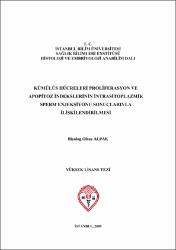Kümülüs hücreleri proliferasyon ve apopitoz indekslerinin intrasitoplazmik sperm enjeksiyonu sonuçlarıyla ilişkilendirilmesi
Künye
Alpak, Olcay. (2009). Kümülüs Hücreleri Proliferasyon ve Apopitoz İndekslerinin İntrasitoplazmik Sperm Enjeksiyonu Sonuçlarıyla İlişkilendirilmesi. Yayımlanmamış yüksek lisans tezi. İstanbul : İstanbul Bilim Üniversitesi, Sağlık Bilimleri Enstitüsü.Özet
Günümüzde yardımla üreme tekniklerini kullanan (IVF: İn vitro fertilizasyon, ICSI: İntrasitoplazmik sperm enjeksiyonu) hastaların gebelik oranı pek çok faktörün etkisi altındadır. Bu faktörlerden bazıları semen kalitesi, ovaryan stimülasyon tipi, östradiol (E2) seviyeleri ve hasta yaşıdır. Bunlar oosit sayısını, kalitesini, matürasyon oranını ve embriyo gelişimini etkilemektedir. Oosit matürasyonun ilerlemesini ya da gecikmesini sağlayan kümülüs hücreleri, lokal ürünler aracılığıyla oositi etkileyerek proliferasyon ve apopitozda güçlü birer düzenleyici olarak rol oynamaktadırlar.
Bu çalışmada, kümülüs hücrelerinin proliferasyon ve apopitoz oranları belirlenip ≤ 37 yaş ve altı ile ≥ 38 yaş ve üstü olmak üzere iki gruba ayrılan hastalarda, mikroenjeksiyon sonuçlarıyla ilişkisi değerlendirildi.
Bu amaçla, mikroenjeksiyon uygulamasına tabi tutulan hastalardan toplanan kümülüs-oosit komplekslerinden alınan kümülüs hücrelerine, prolifere hücre nükleer antijeni (PCNA) monoklonal antikoru uygulanarak proliferasyon indeksi tespit edildi. 4, 6 diaminido 2 phenilindol (DAPI) floresan boyası uyguladıktan sonra mikroskop altında morfolojik kriterlere göre apopitoz oranı belirlendi.
Elde edilen bulgulara göre, kümülüs hücrelerinin proliferasyon oranlarının ≤ 37 yaş ve altındaki grupta anlamlı derecede yüksek olduğu görüldü. Kümülüs hücre apopitoz oranları değerlendirildiğinde ise her iki grup arasındaki fark anlamlı değildi. Proliferasyon ve apopitoz oranları tespit edilen gruplarda ayrıca oosit matürasyonu, fertilizasyon ve gebelik düzeyleri değerlendirildi. Toplanan oosit sayısı ve matürasyon oranlarının yanı sıra gebelik düzeylerinin kümülüs hücrelerinde yüksek proliferasyon indeksine sahip hastalarda anlamlı derecede artmış olduğu saptandı.
Çalışmamızda, mikroenjeksiyon uygulanan hastalarda kümülüs hücre proliferasyon oranlarının sağlıklı gebelik eldesi konusunda önemli bir parametre olan kaliteli oosit seçiminde kullanılabilecek potansiyel bir belirteç olduğu sonucuna varılmıştır. Today, the pregnancy rate of the patients who used assisted reproductive technics (IVF, ICSI) is under the influence of numerous factors. Some of the factors are quality of semen, type of the ovarian stimulation, grade of estradiol (E2) and age of the patients. These ones effect quantity and quality of the oocyte, rate of maturation and embryo development. Cumulus cells are a kind of strong regulator for ovarian cells in proliferation and apoptosis, effect oocyte by the local productions, manage maturation of oocyte.
In this study, we have determined rates of proliferation and apoptosis for cumulus cells, according to age of the patients that seperated to two groups as ≤ 37 and ≥ 38 and evaluated correlation among results of the microenjection.
Due to the aim, cumulus cells that were taken from cumulus-oocyte complex in the patients who are applied microenjection, proliferation index was determined by proliferating cell nuclear antigen (PCNA) monoclonal antibody. According to morphologic criteria under the microscope rate of the apoptosis was determined after the 4, 6 diaminido 2 phenilindol (DAPI) fluoresan staining.
According to the findings, rates of proliferation of the cumulus cells were so high meaningfully for first group as ≤ 37. When rates of apoptosis of the cumulus cells have evaluated, difference between two groups is not significant. Furthermore maturation of oocyte, fertilization and pregnancy rate have evaluated on the groups that were determined rates of the proliferation and apoptosis. It was determined that total oocyte number and maturation rates as well as pregnancy rates increased significantly for the patients who have high proliferation index on the cumulus cells.
In our study, we come to the conclusion that the proliferation rates of cumulus cells are a potentially indicator, will be applied for election of quality oocyte, which is a significant parameter in order to become healthy pregnant on the patients that are applied microenjection.


















